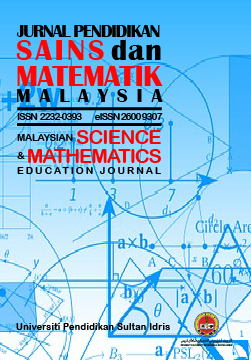An investigation into strategies to improve female secondary school chemistry students’ participation in Science, Technology and Mathematics in Edo State
DOI:
https://doi.org/10.37134/jpsmm.vol10.2.6.2020Keywords:
STM, female students, chemistry, chemistry educationAbstract
This study was carried out to determine the strategies that could improve female chemistry students’ participation in STM education. Two research questions were raised for the study and one hypothesis was formulated. The design adopted for this study is the descriptive survey research design. The sample for the study was two hundred students randomly selected from four schools. A questionnaire titled strategies for improving senior secondary school female chemistry students participation in STM Education was the instrument used for data collection. The instrument was properly validated and its reliability was determined (r=0.81) before it was used. The data collected were analyzed using frequencies and percentages and Mann- Whtiney U test statistics. The findings of the study are as follows (i) use of strategies such as Parental, Teachers, governmental involvement and elimination of socio-cultural factor will improve female students’ participation in STM career (ii). A non-significant difference in the percentage of female chemistry students base on class who agreed that parents, teachers, government and socio-cultural factor have roles to play in promoting female participation in STM education (iii) a significant difference in the percentage of female chemistry students from rural and urban location who agreed on the usage of parents, teachers, government and socio-cultural factor to promote female participation in STM education. Based on the findings, it is recommended that Parents, Teachers, and government should encourage female chemistry students further their career in science, technology and mathematics (STM) related course by providing the needed study materials and guidance respectively among others.
Downloads
References
Aguele, L.I. and Uhumuavbi, P.O. (2003).Gender Inequality in Enrolment in STM in Nigerian Universities: Implications for National Development and self – Reliance. Knowledge Review, 7(1)1-7.
Anan F. (2001). Building a partnership for Girls-child Education.World Education Forum.Dakar Senegal. June 26.
Beilock, S. L., Gunderson, E. A., Ramirez, G., & Levine, S. C. (2010). Female math teachers’ math anxiety affects girls’ math achievement. Proceedings of the National Academy of Sciences, 107, 1860-1863.
Emendu, N.B (2014).The role of chemistry education in national development. The International Journal Of Engineering And Science (IJES) ,1(3), 12-17
Emmanuel, .B. (2013). The place of Nigeria certificate in education chemistry teachers in UBE Basic Science programme. STAN 54th Annual conference proceedings. 177-181
Eraikhuemen, L & Oteze, I. K. (2015) An empirical study of the perception of undergraduates of Nigerian females' participation in Science, Technology and Mathematics. Journal of International Women's Studies.16(3),33-41
Eraikhuemen, L. & Eraikhuemen, I. B. (2010). An analysis of gender disparity in students’ enrolment into Education Science disciplines in the University of Benin. Journal of Mathematical Sciences. 21(4). 363-375.
Fafunwa, A.B (1990) Towards a Humanistic Approach to the Teaching of Science, Technology and Mathematic in the 1990’s key note Address Delivered at the 31st Annual conference of the Science Teachers Association of Nigeria (STAN) conference proceedings, i-x.
Fatokun,K. & Olasehinde,C.O (2016). In N.B. Emendu, (2014). The role of chemistry education in national development. The International Journal of Engineering and Science (IJES) ,1(3), 12-17
Hallinen, J. (2015). STEM Education Curriculum. Encyclopædia Britannica. http//.www.google.com.
Imogie, A.O. & Eraikhuemen, L. (2008). An Inquiry into sex differentiation in Admission and Academic Performance at the University of Benin, Nigeria. Benin Journal of Gender Studies. 1(1): 1-14.
Jerki, A. & Khan, C.G (2020). Influence of teaching experience in knowledge, motivation and implementation of STEM teaching and learning. Jurnal Pendidikan Sains Dan Matematik Malaysia, 10(2), 45-56.
Kong, S.F. & Mohd Matore, M.E (2020). STEM approaches in teaching and learning process: Systematic Literature review (SLR). Jurnal Pendidikan Sains Dan Matematik Malaysia, 10(2), 29 – 44.
Leedy, P.D. (1980) Practical research planning and designing. New York, Macmillan publishing company
Mandina S.1, Mashingaidze S. S& Mafuta J. (2013). Increasing female participation in advanced level mathematics: A perspective from students and teachers in Zimbabwe. African Educational Research Journal, 1(3), 183-190.
Nwelih, E.; Igene, O.O. & Igene, O. K. (2013). An exploratory gender study in computing: a case study of University of Benin, Benin City, Nigeria. Benin Journal of Gender Studies. 3(1&2): 170-179.





